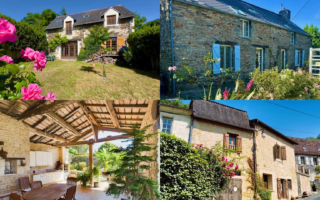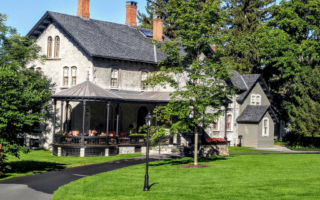Cost Centre – A Guide To Property Taxes
Karen Tait tackles some of your queries about property taxes in France…
What taxes do I have to pay on my French property?
The two main property taxes are taxe fonci�re and taxe d’habitation.
Why do I have to pay them?
They fund local community services such as street lights, street cleaning, schools and rubbish collection (although you may be billed separately for the latter).
What’s the difference between the two taxes?
Taxe fonci�re is paid by the property owner, as long as the property is furnished and habitable (it’s payable regardless of whether it’s occupied). In addition to buildings, private roads, warehouses, boats with permanent moorings and hard standings are all included, as well as unbuilt land.
Taxe d’habitation is payable by whoever lives in a furnished property (owner or tenant, even if rentfree) on 1 January. If you leave the property on 2 January, you still have to pay the tax for the whole year and can’t reclaim part of it from the new owner or tenant. It’s also payable on outbuildings less than a kilometre from a residential property and on business premises that are an integral part of a residential property, such as a B&B or gites. Taxe d’habitation is calculated according to the habitable area of the property (including swimming pools and garages) and on the quality of construction, location, services and facilities. There are eight categories ranging from ‘very poor’ to ‘luxurious’. Taxe fonci�re is the more expensive of the two taxes.
My property is only a holiday home, do I have to pay tax?
Both holiday and permanent homes are liable for property tax. Sometimes permanent residences qualify for a discount.
How are the taxes calculated?
They’re worked out on the property’s theoretical rental value, its ‘valeur locative cadastrale’, which is reviewed every six years. The location also has a bearing on taxes, which can vary greatly from one region to another, and even from one department to another, and areas within a department. They’re usually higher in towns and cities, although not always – Paris, for example, has some of the cheapest property taxes.
What paperwork is involved?
Your local council sends out forms to assess the tax. These should be returned to the Centre des Imp�ts (regional tax office) by a specified date. The tax office then calculates the tax and sends out a bill.
When are they due?
You have up to two months to pay. Late payment incurs a 10% penalty. Taxe fonci�re is usually due by mid-October, and taxe d’habitation is payable by November or December of the year to which it applies. You can pay in installments by direct debit from a French bank account (10 equal payments from January to October, sometimes with an extra adjustment in November).
I’ve recently finished renovating my fermette in Brittany, and my latest bill is much higher than last year. Can you shed any light on this?
As already explained, taxe d’habitation is calculated according to the quality and value of the property, so if you’ve extended or improved your home, and hence added value to it, I’m afraid your property tax rises too. The Land Registry must be informed of any changes made to a property within 90 days.
I’m retired, do I pay less?
I’m afraid not unless you’re over 75. You may qualify for a discount if you’re over 65 on a low income. Only one person per household has to qualify.
Are there any other exemptions or reductions?
New and restored buildings are exempt for two years from 1 January following the completion date. New buildings financed by certain government loans or bought by a low incomes housing association may be exempt for 10- 15 years.
Exemption applications must be made to your local Centre des Imp�ts Fonci�rs or Bureau de Cadastre before 31 December for the following year. They must be made within 90 days of the completion of a new or restored building.
Taxe fonci�re isn’t payable on buildings used exclusively for religious or agricultural purposes.
Taxe d’habitation is not payable on business, farming and student lodging, and official government offices. If you can prove your propertyis uninhabitable, i.e. unfurnished or being renovated, it is temporarily exempt. Mobile homes are exempt if they have an engine.
People receiving a disability pension below a certain level qualify for a discount. Reductions are also available to those with children or elderly dependents.
People who work from home can apply for a reduction in taxe fonci�re. The amount depends on what proportion of your home is used for work, i.e. if your office is 20% of your living area, you are entitled to a 20% reduction in tax. If your bill seems too high, you can query it at your local tax office.
I’m only at the house-hunting stage, how can I find out how much the tax is likely to be?
Your estate agent should be able to tell you what taxes are payable on any properties you’re interested in, but if you’re only at the research stage some French property websites, such as www.century21.fr, usually include the tax payable on the property details.
I’m renting a house, but my landlord says I have to pay property tax – is he trying to con me?
Whoever lives in a property on 1 January pays the taxe d’habitation, even if they’re only a tenant (except short-term tenants). The owner pays the taxe fonci�re.
I’m due to sign the acte de vente on our house in Charente at the end of March – what portion of the year’s tax do I have to pay?
As the purchaser you’re not legally required to reimburse your vendor for a proportion of the property tax paid or due. However, in most cases the notaire splits the tax between the seller and buyer from the date of the sale – a clause to that effect should be included in the first sales contract, the compromis de vente. So when you pay for your property in March, you may be asked to reimburse the vendor for three-quarters (nine month’s worth) of the tax, as long as provision for this has been made in the compromis.
Because reimbursement isn’t compulsory, buyers can negotiate the amount they repay to the vendor – but bear in mind that refusing to pay back any of the tax may not be well received by the vendor.
What other property-related taxes might I have to pay?
You may come across taxe assimil�e (sundry tax), particularly if your property is in a tourist area where the local authorities have to spend more than average on the town’s amenities and upkeep.
Taxe professionelle (professional tax) is payable on business premises. If you work from home you’re also liable for taxe professionelle (although as already mentioned, you can apply for a reduction in taxe d’habitation).
When you sell your property, you are liable for capital gains tax (imp�t sur les plus values) if it is a second home. The rates are 26% for French residents, 16% for nonresident EU citizens, and 33.3% for non-resident non-EU citizens. If you’ve owned your property for more than five years you’re entitled to a 10% reduction for each year of ownership (i.e. 10% for six years, 20% for seven years). After 15 years of ownership, no CGT is payable. You can also offset certain types of improvement work done to the property against your tax bill.
Someone told me the TV licence is now included in my property taxes, is this true?
The cost of a TV licence is now included in the taxe d’habitation.
Are there any other costs I might not have budgeted for?
Household insurance is compulsory in France, to at least third-party liability level. Most people purchase a multi-risk policy (assurance multirisques habitation). Building insurance isn’t obligatory, but is recommended. In copropri�t� apartment blocks, building insurance is included but you still need to insure against third-party liability. Household insurance is automatically renewed annually unless cancelled in writing at least two months before its due to be renewed. In fact, your vendor’s insurance will automatically continue unless you ask them to cancel it.All buildings under construction or undertaking major renovation or repair work must have damage insurance (assurance dommages) that guarantees the work for 10 years (the builder takes out the insurance, and then passes it on to the owner).
And, of course, you should budget for utilities bills, but that’s a whole new article…
Karen Tait
Editor, French Property News
Share to: Facebook Twitter LinkedIn Email


